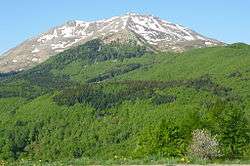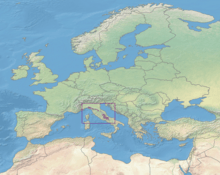Apennine deciduous montane forests
The Apennine deciduous montane forests, a temperate broadleaf and mixed forests biome, are an ecoregion in the mountain ranges of Italian peninsula including the Apennine Mountains. The development of these forests is ensured by the high rainfall Apennines (from 1000 mm in southern Apennine to 2500 mm in northern Apennine), combined with a temperate-cool climate. Because of climate change, the presence of Silver Fir (Abies alba), although still widespread, is dramatically reduced in favour of the beech.


Description
Vegetation zones
The ecoregion has two major vegetation zones:
1. Extensive forests
- Fagus sylvatica
- Silver Fir Abies alba (mixed with beech)
- some relict Pinus nigra var. italica stands.
- some relict Picea abies and Pinus sylvestris (only in Northern Apennine).
With presence of deciduous Quercus ssp. and sporadic Fraxinus ssp., Acer ssp., Tilia ssp., Populus ssp., Castanea sativa, Carpinus ssp., Ostrya ssp., Ulmus ssp., Betula ssp., Sorbus ssp., Salix ssp., Prunus ssp., Taxus baccata, Malus sylvestris, Pyrus and other Central-European broadleaved and coniferous species.
2. Mountain summit meadows and cushion scrubs, with the predominant species:
- Juniperus nana,
- Sorbus chamaemespilus,
- Arctostaphylos uva-ursi,
- Vaccinium vitis-idaea
- relict Pinus mugo (Majella Mountain).
Endemic species
There are a high number of endemic species increasing at higher elevations and representing between 10 and 20% of the total flora.
- Abruzzo Mountains has 1,200 endemic species;
- Gran Sasso and Monti della Laga has 1,500 endemic species;
- Maiella mountains has 1,800 endemic species.
Alpine species include
- Gentiana dinarica,
- Gentiana nivalis,
- Androsace alpina,
- Polygala chamaebuxus,
- Saxifraga oppositifolia,
- Ranunculus seguieri
- Carlina acaulis.
See also
- List of ecoregions in Italy
- List of ecoregions in Europe
External links
- "Appenine[sic] Deciduous Montane Forests". Terrestrial Ecoregions. World Wildlife Fund.